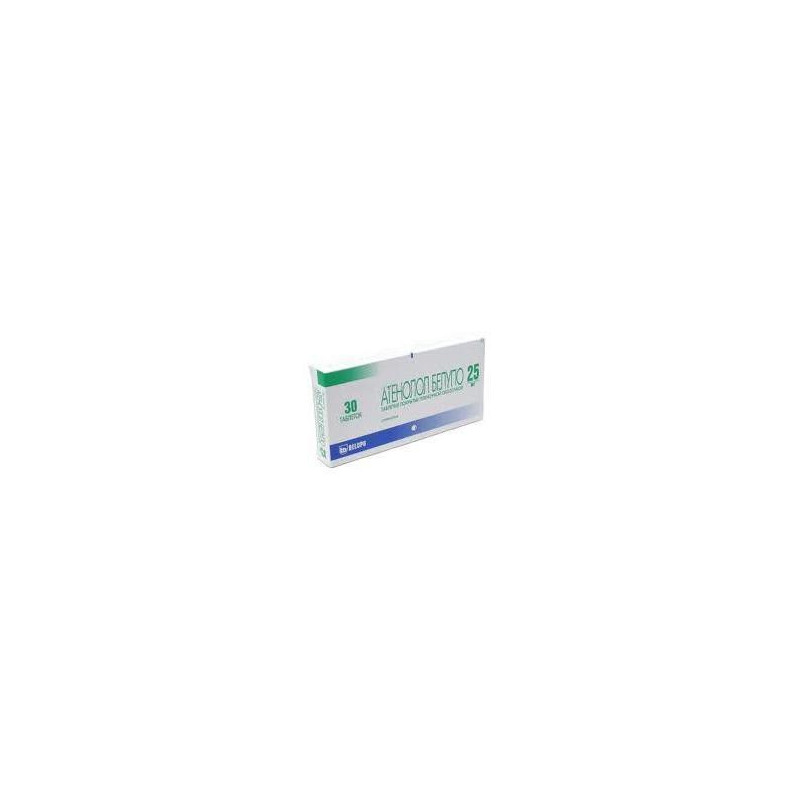



 All payments are encrypted via SSL
All payments are encrypted via SSL
 Full Refund if you haven't received your order
Full Refund if you haven't received your order
Coated tablets
1 pill contains Atenolol 25 mg;
Excipients: microcrystalline cellulose, lactose monohydrate, povidone, corn starch, talc, colloidal silicon dioxide, croscarmellose sodium, Magnesium stearate;
shell composition: hypromellose 5 spz, hypromellose 15 spz, talc, titanium dioxide, disodium edetate dihydrate.
Packaging
30 tablets.
Atenolol has antianginal, antihypertensive and antiarrhythmic effects.
Indications
AV block II and III degree, sinoatrial block, SSS, bradycardia, (HR less than 40 beats / min), arterial hypotension (if used for myocardial infarction, systolic blood pressure less than 100 mm Hg), cardiogenic shock, chronic heart failure stage IIB-III, acute heart failure, Prinzmetal angina, lactation, simultaneous administration of MAO inhibitors, hypersensitivity to atenolol.
Atenolol penetrates the placental barrier, therefore, use during pregnancy is possible only if the intended benefit to the mother outweighs the possible risk to the fetus. Atenolol is excreted in breast milk, so if necessary, use during lactation is recommended to stop breastfeeding.
Dosage and administration
Dosing regimen Atenolol set individually. The usual dose for adults is inside, at the beginning of treatment it is 25-50 mg 1 time per day. If necessary, gradually increase the dose. The maximum dose: adults with oral administration - 200 mg / day. in 1 or 2 doses.
Cardiovascular: in some cases, bradycardia, arterial hypotension, AV conduction disturbances, and the appearance of symptoms of heart failure.
Gastrointestinal: at the beginning of therapy, nausea, constipation, diarrhea, dry mouth are possible.
Nervous system: at the beginning of therapy, fatigue, dizziness, depression, mild headache, sleep disturbances, sensation of cold and paresthesia in the extremities, reduced patient reactivity, decreased secretion of the lacrimal fluid, conjunctivitis are possible.
On the part of the endocrine system: decrease in potency, hypoglycemic states in patients with diabetes mellitus.
Respiratory: in predisposed patients - the appearance of symptoms of bronchial obstruction.
Allergic reactions: pruritus
Other: increased sweating, redness of the skin.
special instructions
Atenolol should be used with caution in diabetes mellitus, COPD (including bronchial asthma, pulmonary emphysema), metabolic acidosis, hypoglycemia; allergic reactions in history, chronic heart failure (compensated), peripheral arterial disease obliterans (intermittent claudication, Raynaud's syndrome), pheochromocytoma, liver failure, chronic renal failure, myasthenia, thyrotoxicosis, depression (in the anamnesis), depression (myopathy), depression (myopathy), depression (including anamnesis),). in pregnancy, in elderly patients, in pediatrics (efficacy and safety not determined). With the use of atenolol, it is possible to reduce the production of tear fluid, which is important for patients using contact lenses.
Interaction
With the simultaneous use of diuretics increases antihypertensive effect. With the simultaneous use of funds for inhalation anesthesia increases the risk of increased cardiodepressive action and the development of arterial hypotension. There are reports of the development of bradycardia and arterial hypotension with simultaneous use of alcuronium chloride. With the simultaneous use of Verapamil increases the negative inotropic effect, develops bradycardia, bradyarrhythmia, pronounced conduction disorders; described cases of postural hypotension, dizziness, left ventricular failure, lethargy.Under the influence of verapamil, the pharmacokinetic parameters of atenolol do not change significantly, although a case of increasing AUC of atenolol is described.
Overdose
Symptoms: severe bradycardia, AV block II-III degree, increase in symptoms of heart failure, excessive decrease in blood pressure, difficulty breathing, bronchospasm, dizziness, fainting, arrhythmia, ventricular extrasystole, cyanosis of fingernails or toenails, seizures.
Treatment: gastric lavage and prescription of absorbent drugs; in the event of bronchospasm, inhaled or intravenous beta 2 -adrenomimetika Salbutamol is indicated.
Storage conditions
Store at a temperature not higher than 25 ° С.
3 years.
Atenolol